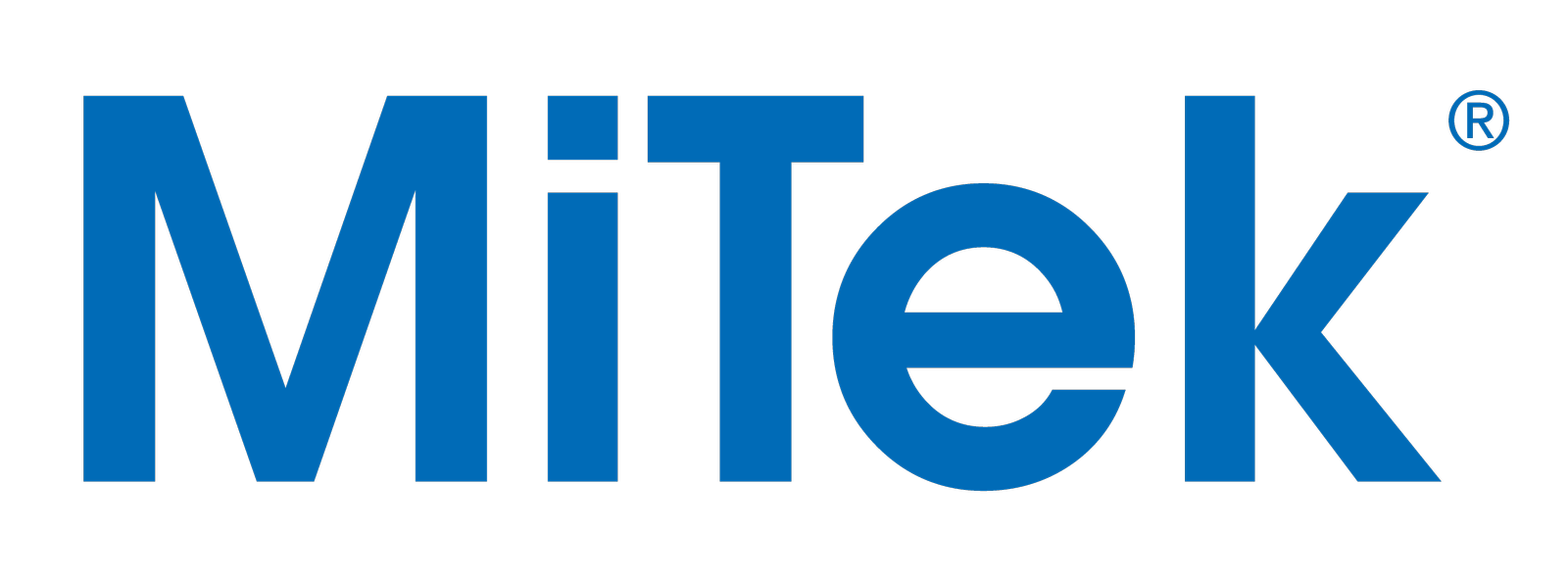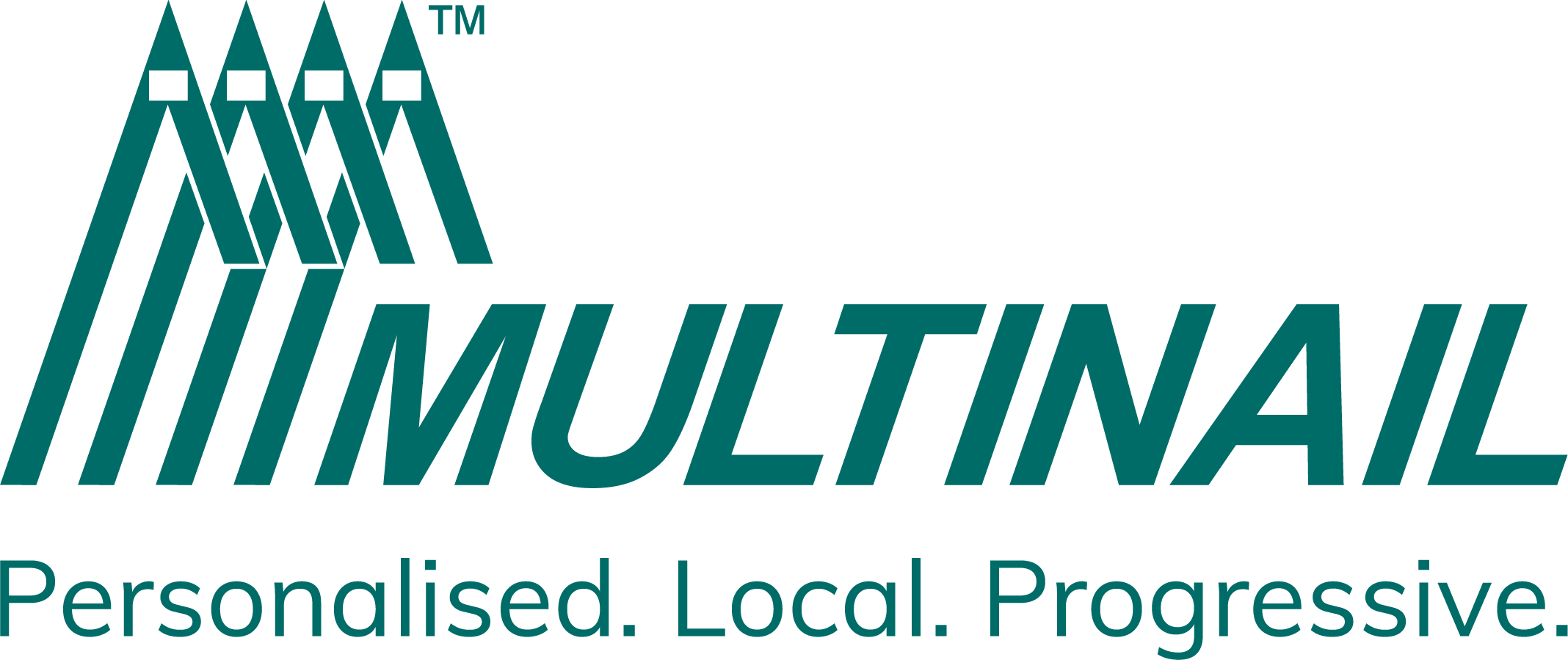This piece was written by FTMA’s Kat Welsh.
Being Candid, and Being Vulnerable Leads to Productivity
I’m going to assume those 2 words might put a lot of people off from reading this article – but here goes. Because, at the end of the day, if you want your business to have long-term, skilled, and committed workers – which increases productivity and quality – hopefully you’ll keep reading.
When I started out in the working world the terms candid, or vulnerable, weren’t even close to being a part of any of my jobs. Terms I DO remember were “suck it up”, “what are you whining about”, and “shut up and get on with it.” These were the daily mantras.
I didn’t stick at those jobs long. Not because I wasn’t good at what I did, but because I didn’t want to be in a place each day, that made me feel defeated.
In one place where I did tough it out – I loved the work and it was my dream job – due to the toxic workplace culture, I ended up burnt out, on a WorkSafe claim, and struggling with ongoing PTSD triggers even years after I left. By the way, that’s me being candid and vulnerable, sharing this about myself. Hopefully it might give anyone reading this, validation about their own journey.
Over the past several weeks, on behalf of FTMA, I have been doing a Certificate in Leading Safety and Care, with The Michelle McQuaid Group. The purpose was to look at models of wellbeing in the workplace, and bring this knowledge back to FTMA.
Dr. Michelle McQuaid has a Masters of Applied Positive Psychology from The University of Pennsylvania, and in 2012 set up The Wellbeing Lab and The Leaders Lab, (TLL) – devoted to bringing positive change to people’s lives, schools, and workplaces. Michelle and her team, take leading psychological research – what constitutes wellbeing – and turn it into practical steps. One of their core tools, is developed from research and PERMA frameworks established by Professor Martin Seligman.
The PERMA framework is a template of wellbeing, at work, at school, and within the community. It attempts to break down what happiness, or fulfilment, looks like and what constitutes a balanced life. It stands for Positive emotions; Engagement; Relationships; Meaning; Accomplishment.
Other researchers, have developed the framework further, including Dr. Michelle McQuaid, and added Health to the list – acknowledging that physical balance and support is essential to contribute towards a state of contentment.
The framework has become utilised internationally and is the backbone of wellbeing assessments by governments, education departments, and global organisations. The SA Government have used it to assess how people are feeling, and what could be implemented for more life satisfaction in the SA community. The Victorian Government offers a free online tool based on the PERMAH framework.
But let’s bring it back home a bit, and work out what it might mean on a personal level, or to a small business.
Why Does It Even Matter?
We’ve all been hearing a lot about the psychosocial hazards recently, so I won’t go into too much detail, but see below for a quick refreshment on how Safe Work Australia defines them.
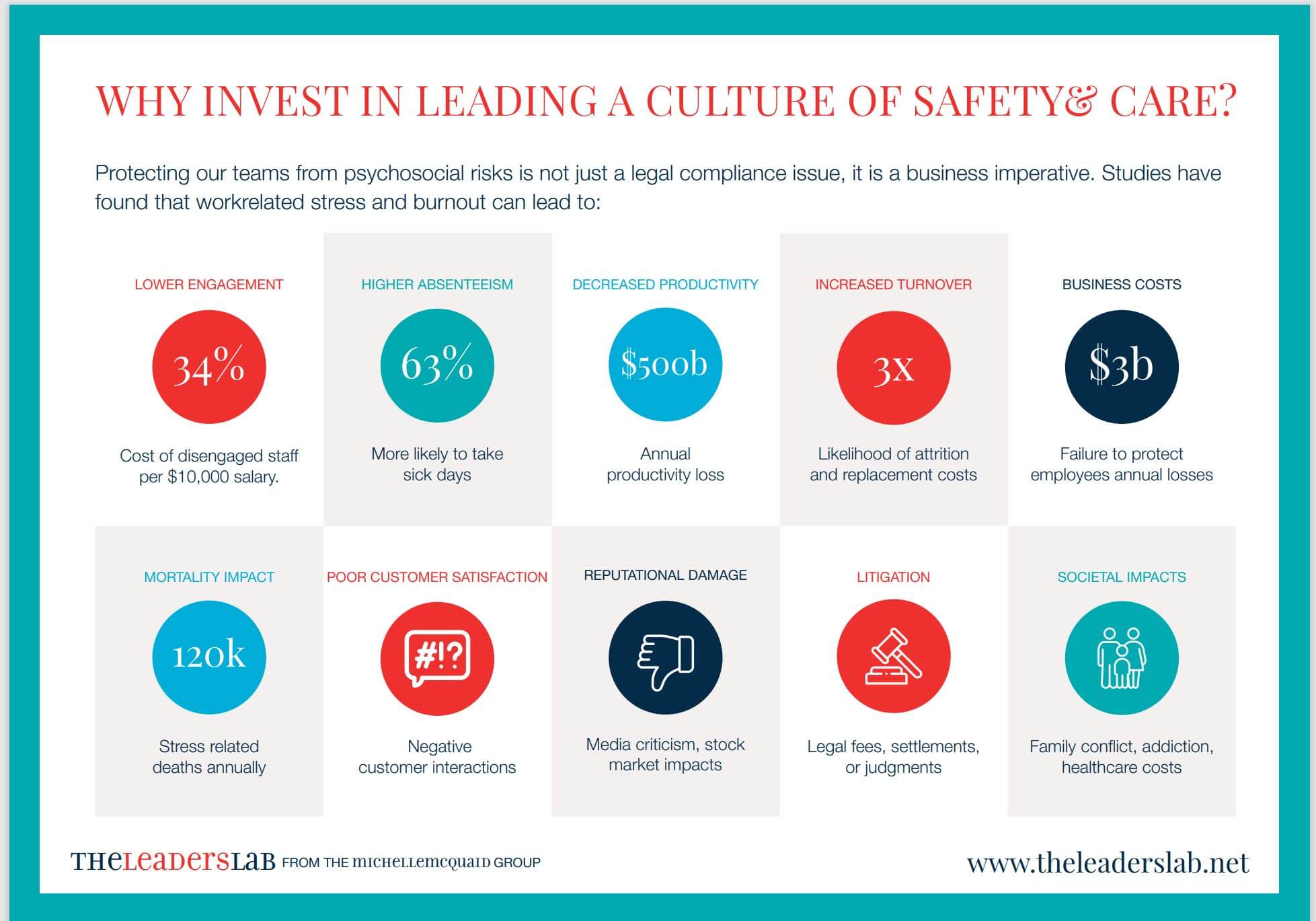
The reason, why the Australian Government is pushing for harder mental health legislations in the workplace, has been brewing for a while. Mental illness rates have been steadily rising for years. Being reactive to the needs of the community has not been working – waiting until people are in crisis is costly, mental health supports are limited, underfunded, and getting harder to access. It begs the question, what can be done differently and what can be preventative?
If we look to parts of Europe, where countries like Sweden, Finland, and The Netherlands, have been putting funding into improving social conditions and early interventions over the last few decades, mental illness rates have dropped. Incarceration rates have dropped. These countries also consistently assess and realign strategies to meet needs before they reach disaster status. Especially recently with the pandemic.
It’s not just the responsibility of government to make our community a better place, but it’s for all of us to do what we can. Workplaces need to provide for a safe working environment, physically / mentally, given that a massive proportion of us spend time working. Injuries, in all capacities, have the ability to impact the entirety of people’s lives.
Research proves that even in workplaces where there may be risks or hazards, or whatever you want to call them, if the culture is one of mental safety and care, there are less rates of burnout. When people feel that the team is strong, supportive, and safe, they are able to speak up, be part of the problem solving, and each one of those PERMAH values goes up for individuals and for the workplace.
It matters because if people don’t feel cared about, if their safety (physically or mentally) is not prioritised, or it’s even neglected, their dedication for the work goes down. Input goes down. Production goes down. Product quality goes down. People leave. Staff turnover suffers. Skilled workers reduce. Mental illness goes up. And regardless of how costly that is to the business or the support services, people suffer.
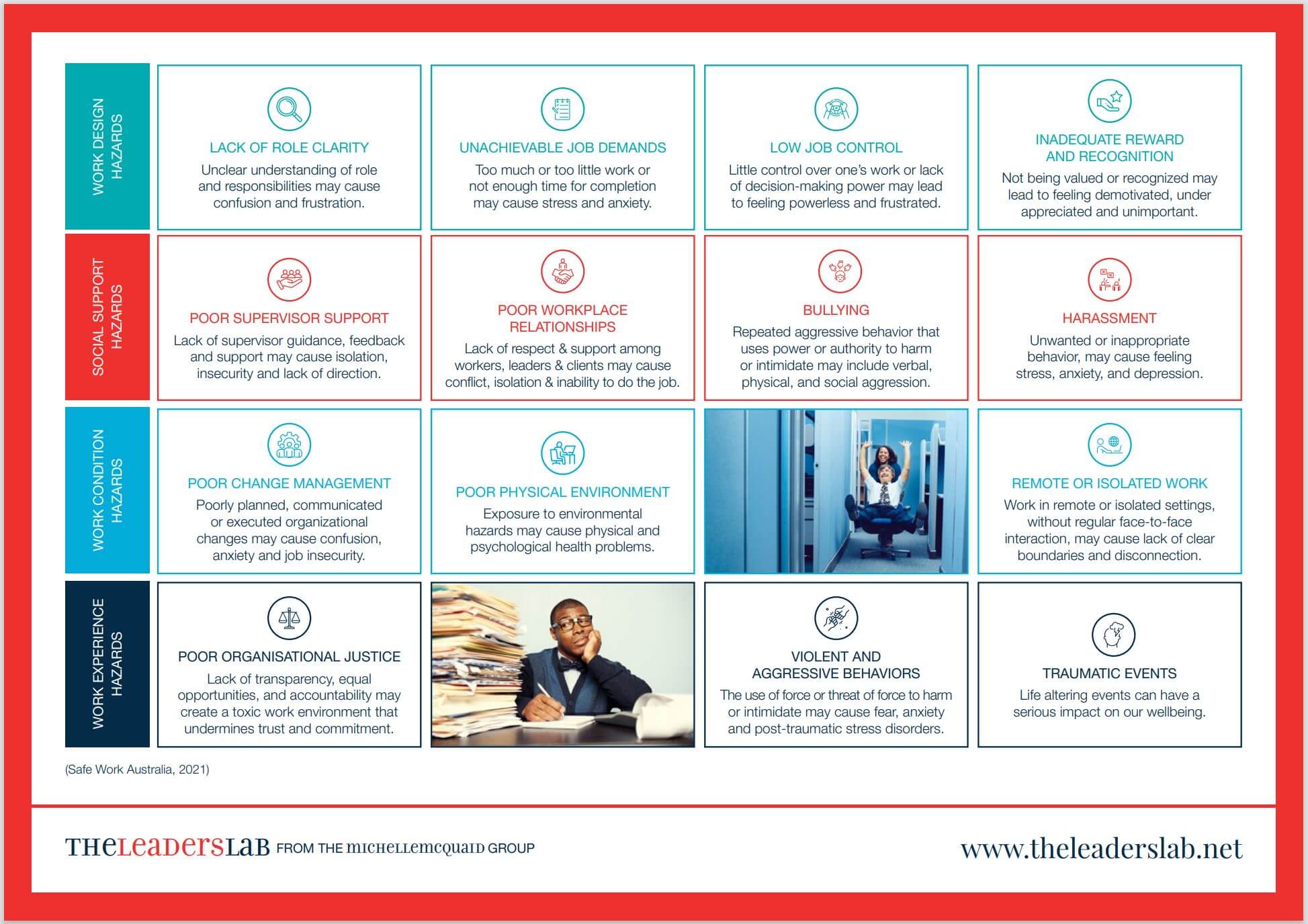
How to C.A.R.E.
Here’s another acronym for you; C.A.R.E. – Compassion; Appreciation; Responsibility; Emotional Wisdom. TLL believe if you can implement these basic practices into the daily grind, the psychological safety of the workplace will improve.
Compassion – means to recognise the struggles of another (or the workplace) and to take action in a positive way. What is the workplace culture like if someone stuffs up? Is it critical and blaming? Or is it an opportunity to look at what happened and help reduce it next time. If someone is being treated disrespectfully, will something be done about it if it gets reported? How is everyone actively participating to support each other, communicate, and show humanity? How are the team allied? How are we connecting as humans, not just worker bees?
Appreciation – means to identify what you are grateful for with employees, team mates, employers, whatever your angle in the workplace. How does that get shown? Appreciation can feel tokenistic if it’s not backed up with daily behaviours that show how things are appreciated. It can be speaking respectfully to everyone around you, even if there issues, there are ways of dealing with things that still make everyone feel valued. Celebrating achievements and showing thanks for them – whether you’re the boss or the person that’s been there 2 weeks – helps us meet the ‘meaning’ in the PERMAH.
Responsibility – everyone has a responsibility at work to maintain a growth mindset culture. How is everyone involved in being part of the solution? Are staff given the opportunity to make decisions about their work, their role, and what would help? Can you see any psychosocial hazards in your workplace – can you raise it? How do you take responsibility for your own behaviour at work? Do you model respectful and inclusive behaviour, not just expect it. If you’re a team leader, how do you respond to employees reporting issues to you?
Emotional Wisdom – How are we all approaching our behaviour to each other? Are we reactive to how we feel and taking it out on co-workers? Are we able to break down what’s behind it and advocate for a better working environment? How are we respectfully treating our staff, employees, team leaders, managers – everyone is part of the picture. Even negative emotions are valuable to work out why we’re having them and what needs to be changed but doing it in a respectful way and directing it in the right place.
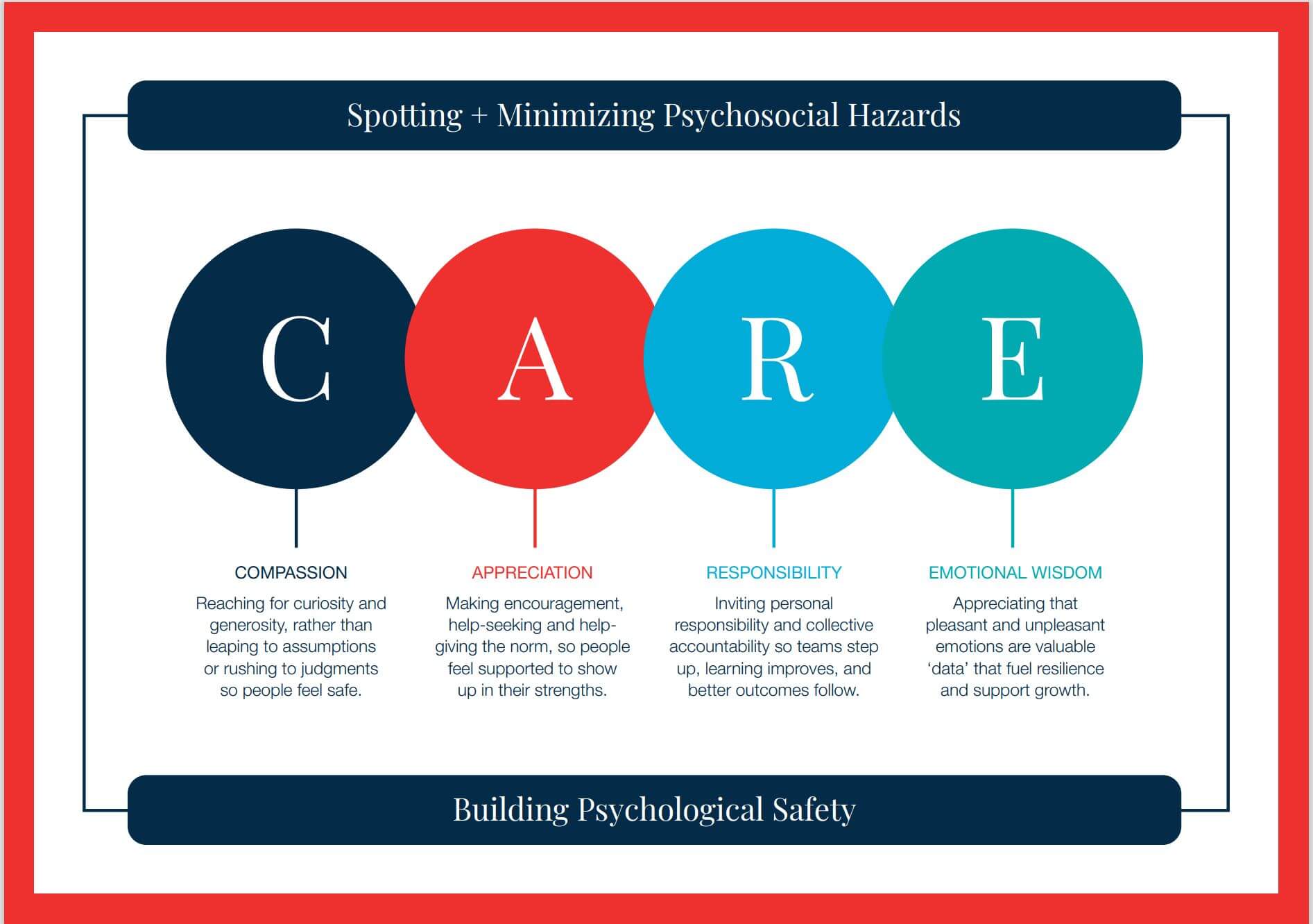
There is so much more to what constitutes being safe at work. Which is why there will be a part 2 to this article. And I will go into more detail about strategies, and what TLL have developed. But for now, a few basic questions…
- What is working?
- What are we struggling with?
- What can we try?
- And what can we learn from it?
Supporting a working environment where it’s ok to speak up, even if it’s about something minor, is crucial to staff and businesses flourishing. Being candid, or genuine and honest, about anything can feel like a massive risk. This is where it feels vulnerable – that uncomfortable place. If we don’t know what the outcome will be, the fear of humiliation, being punished, or feeling demoralised, makes us stay quiet. We’ve all had experiences of being shot down for trying to speak up – but we need to keep speaking up.
Whatever anyone’s role in the workplace, they are part of the equation and can be part of the solution. Everyone has valuable insight and experience, and culture involves us all. Even if you think everything is fantastic, ask the questions, keep asking the questions, and keep making sure that it stays fantastic.
This isn’t about blame, or finger pointing. Although there may be times when someone needs reminding about respectful behaviour. This is about identifying needs and responding to them, so everyone has that PERMAH balance. It is about changing behaviours or cultures that don’t support growth. It is about building a place where everyone feels respected, included, and equal – regardless of rank, gender, or ethnicity.
Our Principal Partners
